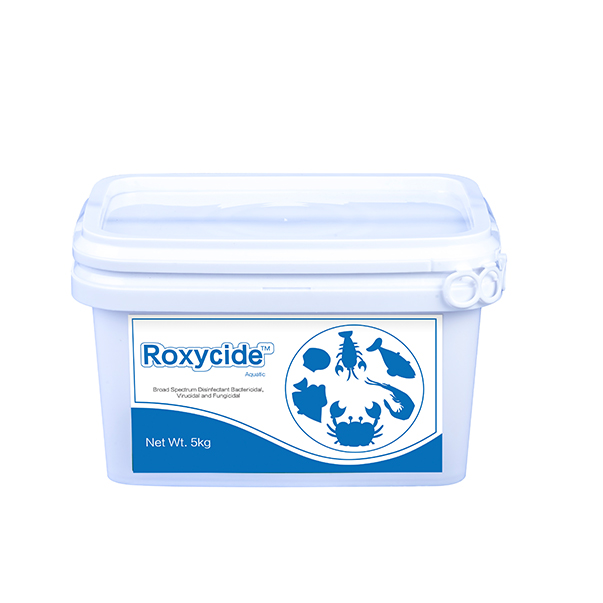Roxycide for Aquaculture Disinfection

Product description
Roxycide™ an activated oxygen disinfectant that provides solutions for four key challenges for the Aquaculture industry:
Pathogen Control: a highly effective disinfectant against both bacteria and viral pathogens
Biosecurity: an effective tool in the prevention of disease transmission and management
Pond Ecology Management: a mode of action that donates oxygen to the water while helping to manage organic matter
Eco-friendly: active constituents degrade to inert and safe substances allowing ongoing and extended usage in the presence of aqua species.
Key Benefits in Aquaculture of Roxycide for Aquarium Disinfectant
The high quality disinfectant has application flexibility to address key production stages including pond preparation, ongoing water management, and disease outbreaks.
Increases oxygen levels in water to help sustain maximum production in ponds and maintain a sustainable pond ecology. Highly effective in the presence of organic matter.
Highly effective in Aquaculture to control and eradicate bacteria, fungi, molds, and all viral families affecting Fish, Shrimp, Crab, and other Aquatics.
The disinfectant for livestock is used to prevent bacterial diseases including gill-rot, white spot disease, ascites, enteritis, putrid skin disease, decayed crusta disease, saprolegniasis.
Spectrum Applications of Roxycide for Fish Tank Disinfectant
Application Strategy of Roxycide for Aquaculture Disinfection
Roxycide™ Usage Instructions of Roxycide for Aquaculture Disinfection
Do not attempt to pour Roxycide™ Powder directly into aqua ponds.
Calculate the volume of water in the pond in cubic meters (m3).
Select the desired application and dosage required from the table above. Calculate dosage depending on the volume of water in the pond.
Always make a base/stock solution by dissolving the required quantity of Roxycide™ powder into fresh, air temperature water at a ratio of 1:100 for best results (example; 1kg Roxycide™ to 100 liters water).
Use a clean container of sufficient size (example 200 liter drums or 1000 liter IBCs)
To make the base/stock solution, mix the required amount of Roxycide™ powder into water, while stirring or agitating to helpfully dissolve Roxycide™ in the base solution water.
Evenly distribute the base solution to the pond, ideally where there is water movement or aeration paddles to aid in dispersal.
Clean and disinfect containers and equipment after.
Storage of stock solution: 5-7days.
Roxycide™ Application and Dosage Directions of Roxycide for Aquaculture Disinfection
Applications Treatment Periods Roxycide™
powder/pond
(gram/m3)
Disinfection 1-2 days prior to 1.2g/m3
before stocking stocking
Disease prevention Once every 10 days. 0.8-1.0g/m3
in stocked ponds
Disease outbreaks Once every 3days then repeated every 3 days. 0.8-1.2g/m3
Treatment of fungi Once a day and 1.5g/m3
buildup repeated for 3 days
Water purification Once every 3 days 0.2-0.3g/m3
Roxycide™ Application and Dosage rates for Equipment and Bio-Security
Tasks Dilution Coverage Comment
Equipment disinfection Foot dips, Walls, Roofs, floors, Tanks, and other equipment including Hatchery, Nursery, Nets, Tanks, aeration machines, and paddles. 0.111111111 300ml/m2 Change foot
dips every 3 to
4 days
Barrier Control: Boats and Vehicles 0.180555556 300ml/m2
including feed trucks
How to Sanitize a Fish Tank
First, you should clean up the fish tank.
next, put the aquaculture disinfectant in a spray bottle and use an 8:1 water/bleach ratio to make a spray. Spray the fish tank and clean it up.
Then you leave the tank to dry. Once the tank has been left to dry for 24 hours, fill it with water. If the disinfectant contains chlorine, remember to add a de-chlorinator.
Empty the tank and add the de-chlorinator again to make sure it is void of chlorine., and the tank is now ready to use.

